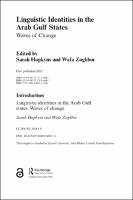Chapter Introduction
Proposal review
Linguistic identities in the Arab Gulf states: Waves of change
Abstract
The introductory chapter provides an overview of the book’s main theme: linguistic identities in the Arab Gulf States and waves of change. The introduction discusses the content of the book’s twelve chapters as well as the need for the volume. The book’s first part (Chapters 1-3) explores the theme of language and power in the Gulf from multiple angles including an exploration of power relations between languages and their speakers. The book’s second part (Chapters 4-6) explores media representations of Gulf linguistic identities through the mediums of social media, modern fiction, and television drama. The focus of the book’s third part (Chapters 7-9) looks at how a wide range of linguistic phenomena, situated in broader social movements, have changed over time. Transitions discussed include an analysis of Gulf expatriates’ ambivalent identities, changing sociolinguistic landscapes during the Coronavirus pandemic, and a move away from culturally biased international English tests toward locally produced assessments. The final part of the book draws readers’ attention to English-medium instruction contexts in the Gulf and discusses translanguaging for transformation, multilingual teacher identities, and emotions of students studying in English-medium universities.


 Download
Download